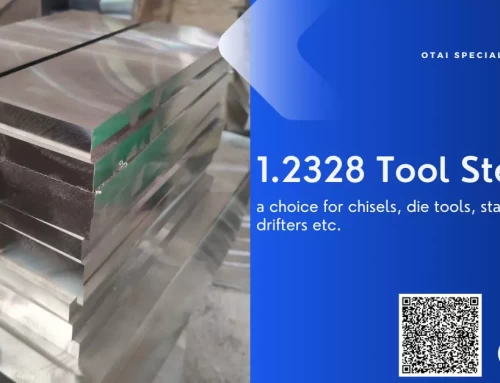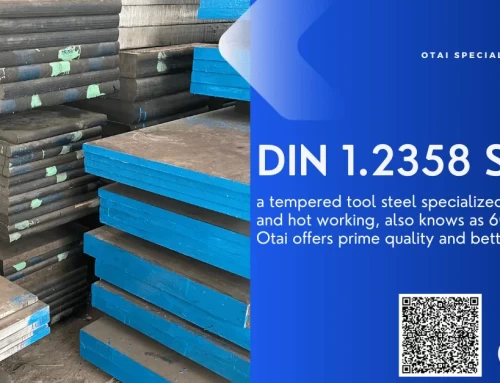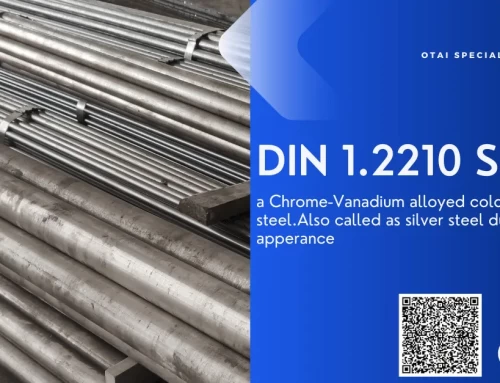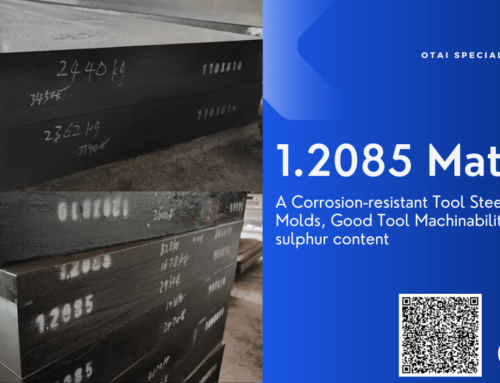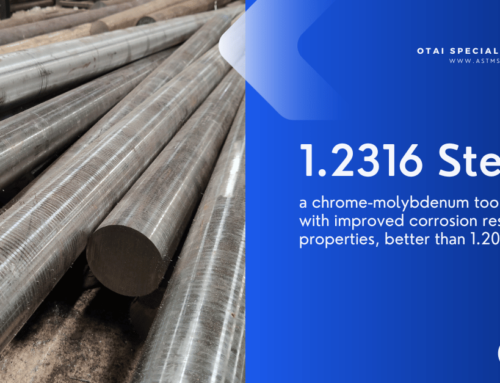If you are looking for a tool steel that can withstand heavy shock and abrasion, you might want to consider DIN 1.2550 steel from DIN EN 4957 standard. This steel grade is also known as ASTM / AISI S1 or 60WCrV8, and it belongs to the alloy cold-work tool steel category. In this post, we will introduce the chemical composition, mechanical properties, heat treatment, applications, and equivalent grades of 1.2550 steel.
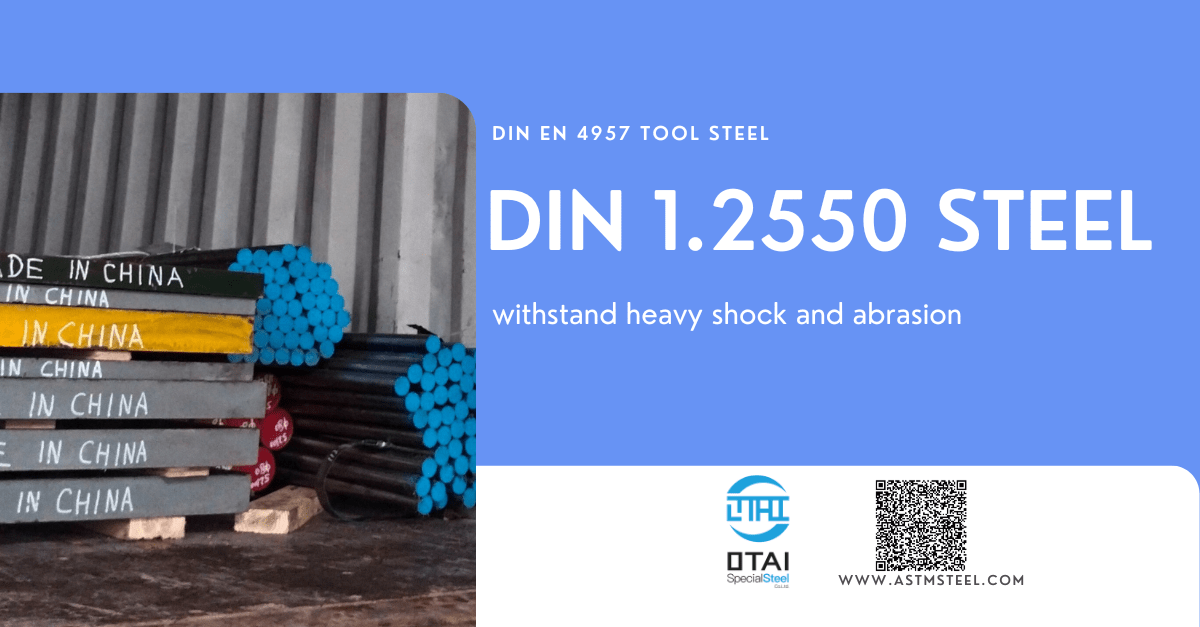
Chemical Composition of 1.2550 Steel
The main alloying elements of 1.2550 tool steel are tungsten, chromium, and vanadium. These elements give the steel high wear resistance, fatigue resistance, and toughness. The following table shows the chemical composition of 1.2550 grade steel according to the EN ISO 4957 standard1.
| Element | C | Si | Mn | P | S | Cr | W | V |
|---|---|---|---|---|---|---|---|---|
| Weight % | 0.55-0.65 | 0.7-1 | 0.15-0.45 | max 0.03 | max 0.03 | 0.9-1.2 | 1.7-2.2 | 0.1-0.2 |
Equivalent Grades of 1.2550 Steel
1.2550 steel has several equivalent grades in different standards and countries. The following table shows some of the equivalent grades of 1.2550 steel.
| Standard/Country | Grade |
|---|---|
| EN ISO | 60WCrV8 |
| USA | S1 |
| Germany | DIN/EN/WNr:60WCrV7 |
| France | AFNOR:55WC20 |
| England | BS:BS1 |
| Italy | UNI:55WCrV8KU |
| China | GB:6CrW2Si |
| Poland | PN:NZ3 |
| Czechia | CSN:19733 |
| Austria | ONORM:K455 |
| Russia | GOST:5KHV2S |
| ISO | 60WCrV8 |
Mechanical Properties of 1.2550 Steel
The mechanical properties of 1.2550 steel depend on the heat treatment condition and the cross-sectional size of the specimen. The following table shows some typical values of the mechanical properties of 1.2550 tool steel in different conditions2.
| Condition | Hardness (HB) | Tensile Strength (MPa) | Yield Strength (MPa) | Elongation (%) | Impact Energy (J) |
|---|---|---|---|---|---|
| Soft annealed (+A) | max 229 | – | – | – | – |
| Quenched and tempered (+QT) | 58-62 HRC | 1800-2000 | 1500-1700 | 8-12 | 25-35 |
| Cold drawn (+C) | – | – | – | – | – |
Heat Treatment of 1.2550 Tool Steel
The heat treatment of 1.2550 steel involves soft annealing, hardening, and tempering processes. The following are some general guidelines for the heat treatment of 1.2550 steel.
Soft Annealing
Soft annealing is done to reduce the hardness and improve the machinability of the steel. The soft annealing temperature is between 720°C and 750°C, and the cooling is done in a furnace or in air.
Hardening
Hardening is done to increase the hardness and wear resistance of the steel. The hardening temperature is between 860°C and 900°C, and the cooling is done in oil or air or hot bath.
Tempering
Tempering is done to reduce the brittleness and improve the toughness and fatigue resistance of the steel. The tempering temperature depends on the desired hardness and mechanical properties of the steel, but it is usually between 180°C and 400°C.
Applications of DIN 1.2550 Steel
1.2550 tool steel is suitable for both hot and cold work applications that require high shock resistance and moderate hot hardness. Some examples of the applications of steel number 1.2550 material are:
- Tools for cold cutting, such as shear blades, industrial knives, scrapping scissors, circular scissors, etc.
- Hot extrusion dies, such as forging die forging hammer, forging press die, precision forging die, etc.
- Die-casting molds for aluminum, copper, and alloys.
- Blanking punching dies for thin sheet, cold piercing tools, trimming tools, profile shear blades, slitting cutters, woodworking tools, small engraving tools, ejectors, etc.
Conclusion
DIN 1.2550 steel is a shock-resisting tool steel that can be used for both hot and cold work applications. It has high wear resistance, fatigue resistance, and toughness due to the presence of tungsten, chromium, and vanadium. It can be heat treated by soft annealing, hardening, and tempering to achieve different hardness and mechanical properties. It has various applications in cutting, extrusion, die-casting, punching, piercing, trimming, slitting, woodworking, engraving, etc. It also has several equivalent grades in different standards and countries.
FAQs
- Q: What is the difference between 1.2550 tool steel and 1.2510 tool steel?
- A: 1.2550 grade and 1.2510 steel are both alloy cold-work tool steels, but they have different chemical compositions and mechanical properties. DIN 1.2550 steel has more tungsten and vanadium than 1.2510 steel, which makes it more wear-resistant, fatigue-resistant, and tough. 1.2510 steel has more manganese than 1.2550 material, which makes it more machinable and weldable.
- Q: How to weld 1.2550 material?
- A: Welding of 1.2550 tool steel is not recommended because it may cause cracking and loss of hardness. If welding is unavoidable, it should be done with low heat input and preheating and postheating treatments. The welding filler material should be of the same or similar grade as the base metal.
- Q: How to machine DIN 1.2550 steel?
- A: Machining of 1.2550 tool steel is difficult because of its high hardness and wear resistance. It requires high cutting speed, low feed rate, and adequate cooling. The cutting tools should be made of high-speed steel or carbide.
- Q: How to store DIN 1.2550 steel?
- A: 1.2550 grade steel should be stored in a dry and clean place away from moisture and corrosive substances. It should also be protected from mechanical damage and deformation.
- Q: How to buy steel 1.2550?
- A: If you are interested in buying 1.2550 tool steel or any other tool steel products, you can contact us at jeremy@otaisteel.com or by WhatsApp +8613610149979 online. We are Dongguan Otai Special Steel, a professional tool steel supplier and manufacturer in China with over 20 years of experience. We can provide you with high-quality products, competitive prices, fast delivery, and excellent service.

